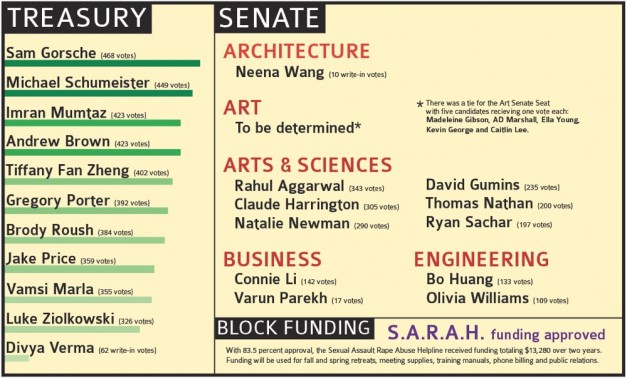Student Union
Uncompetitive elections open door for write-in candidates
Write-in candidates dominated in this week’s Student Union elections.
Due to a lack of candidates who collected the necessary signatures to be on the ballot, many write-in candidates saw success, including Divya Verma for a Treasury seat, Neena Wang for the Architecture Senate seat and Varun Parekh for a Business School Senate seat.
There was a five-way tie for the single Art School Senate seat, with one vote per candidate. At the time the results were published, the candidates were still being contacted about seat selection.
Leigha Empson, senior and speaker of SU Senate, believes the elections would have been more competitive if students better understood what impact senators have on students.
“ArtSci Senate was competitive, but I think that if people realized what was at stake for the elections, the turnout would have been higher,” Empson said. “Even the plastic bag ban—that’s a direct result of who’s elected to Senate.”
The Arts & Sciences Senate race had six winners receive more than 30 percent of the vote. Junior Rahul Aggarwal led the way with 343 votes (52.61 percent) from the 652 students voting (16.49 percent of eligible voters).
The seat for Architecture began without a registered candidate, but Wang received 10 of 15 total votes to win the seat. With one candidate for two Business Senate seats, Parekh received 17 write-in votes to win the second seat.
With 10 students vying for 11 Treasury seats, Verma garnered 62 write-in votes to win the final seat.
As is typical, the election was marked by relatively low voter turnout, with 1,470 students (22.24 percent of 6,610 eligible voters) submitting votes online. That number is down from the more than 1,700 voters in 2011 and 1,529 voters in 2012.
Junior Jodi Small, SU election commissioner, believed outreach for the election was strong despite a lack of candidates running for each position.
“I think that we did a lot of different things to try and reach out to the student body: a banner, Facebook post, an ad in StudLife, all school emails—but there’s still always room to improve,” Small said.
The Sexual Assault and Rape Anonymous Helpline won 83 percent of the vote to pass the group’s block funding appeal, ensuring that the group is funded for the next two years. 1,120 students voted on the measure, or 16.94 percent of all students.
Dylan Bassett, Richard Matus, Sahil Patel, Emily Schienvar and Michael Tabb contributed to this report.

